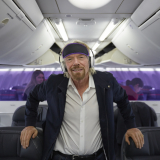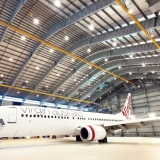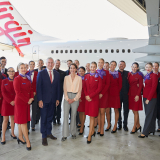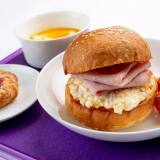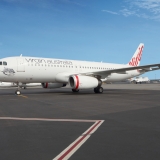Virgin Australia Holdings Limited (ASX: VAH) Reports Financial Results for Full Year Ended 30 June 2016
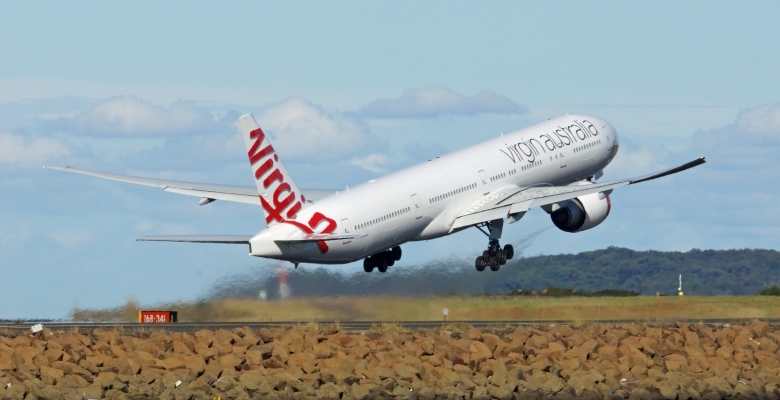 Photo courtesy of Tian Lawson
Photo courtesy of Tian Lawson Virgin Australia Group FY16 Financial Summary1.2
• Group Underlying EBIT of $210.6 million – an improvement of $144.7 million on FY15
• Group Underlying Profit Before Tax of $41.0 million – an improvement of $90.1 million on FY15
• Group Statutory Loss After Tax of $224.7 million – impacted by $440.5 million in pre-tax restructuring charges, primarily related to fleet simplification under the Better Business program and other efficiency activities
• Group revenue of $5,021.0 million – growth of 5.7 per cent on FY15
• Group CASK (excl. fuel, FX and VFF) declined by 1.9 per cent on FY15
• Total cash balance of $1,123.8 million, excluding proceeds of $852 million entitlement offer to be received in August 2016
• Financial Leverage improved by 11.9 per cent from 5.9x to 5.2x as at 30 June 2016, with further improvement to 4.1x when adjusted for entitlement offer, top-up placement and repayment of shareholder loan facility3
Virgin Australia Group Highlights
• Virgin Australia Domestic4 – Underlying EBIT growth of 45.8 per cent on FY15 with strong improvement in key financial metrics of RASK, Yield and Underlying EBIT Margin
• Virgin Australia International5 – almost 30 per cent improvement in Underlying EBIT and on track for profitability by the end of FY17
• Tigerair Australia6 – first ever full year profit, one year ahead of target
• Velocity – revenue up 37.4 per cent and membership growth of 20 per cent on FY15
• Decisive action taken to build a stronger business:
Optimisation of balance sheet, improvement in liquidity and reduction of debt through capital structure review and subsequent equity raising
Strong focus on lowering cost base through existing efficiency activities and implementation of Better Business program of capital and operational efficiency initiatives. The Group is targeting net free cash flow savings increasing to $300 million per annum (annualised run rate) by the end of FY19
Development of new revenue opportunities including proposed strategic alliance with HNA to gain direct access to the Chinese travel market7
5 August 2016: Virgin Australia Holdings Limited (“the Virgin Australia Group” or “the Group”) (ASX: VAH) today reported an Underlying Profit Before Tax of $41.0 million for the 2016 financial year, in line with guidance, and an improvement of $90.1 million on the 2015 financial year. The Group reported a Statutory Loss After Tax of $224.7 million, which includes the impact of previously announced pre-tax restructuring charges, primarily related to the Better Business program and existing efficiency initiatives.
Virgin Australia Group Chief Executive Officer John Borghetti said: “In the 2016 financial year, the Virgin Australia Group delivered a stronger underlying performance, growing Underlying EBIT by $144.7 million to $210.6 million. This result was driven by continued improvements in earnings across all business segments notwithstanding a weak operating environment.
“Virgin Australia Domestic delivered strong improvements across all key metrics during the year, while Virgin Australia International continued on a positive trajectory. Tigerair Australia has delivered its first ever full year profit one year ahead of schedule, and Velocity is delivering consistent growth.
“During the 2016 financial year, the Group completed a capital structure review in order to strengthen its balance sheet, improve liquidity, reduce debt and build a lower, sustainable cost base to improve earnings and cash flow. This was followed by the launch of a fully underwritten entitlement offer to raise equity.
“During the year, major components of the Group’s fleet simplification program were initiated, being the decommissioning of the Fokker 50 aircraft, removal of Embraer 170 aircraft and a reduction in Embraer 190 jets and some ATR capacity. The Group also commenced the Better Business program, which will drive efficiency and productivity across all parts of the business. Through this program, fleet restructuring will continue with the planned removal of some ATR aircraft, all Embraer 190 aircraft and Tigerair-branded A320 aircraft over the next three years.
“While there are costs associated with implementing these activities and initiatives, these are outweighed by the significant, ongoing future savings that will be delivered. The Group remains on track to exceed its existing target of $1.2 billion in cumulative cost savings by the end of the 2017 financial year. Additionally, the Group is targeting net free cash flow savings increasing to $300 million per annum (annualised run rate) by the end of the 2019 financial year through the Better Business program.
“The Group enters the 2017 financial year with a strong strategic shareholder base and new opportunities for further revenue growth, including the proposed strategic alliance with HNA. The alliance will provide direct access to China, Australia’s fastest growing and most valuable inbound travel market.7
“As a result of these actions, the Group is in a better position to achieve its goals and deliver long-term growth and shareholder value.
Group Financial Performance
Revenue and earnings
“Group revenue was $5,021.0 million, representing an improvement of 5.7 per cent on the 2015 financial year, while Group Underlying EBIT was $210.6 million, an improvement of $144.7 million.
Costs
“Strong cost discipline during the year resulted in a reduction in Group Cost per Available Seat Kilometre (excluding fuel, FX and VFF) by 1.9 per cent on the 2015 financial year.
Restructuring costs
“Consistent with prior disclosures, $440.5 million in restructuring and transaction costs, impairment losses on assets held for sale and other assets as well as onerous contract expenses were incurred during the 2016 financial year. These primarily related to the implementation of the Better Business program and other efficiency activities, including the removal of surplus ATR capacity and E190 aircraft from the Group’s fleet.
Cash and debt position
“The total cash balance for the 2016 financial year was $1,123.8 million, up 9.3 per cent from $1,028.5 million in the previous year. The unrestricted cash balance was $728.9 million, up from $718.9 million in the previous year. This excludes the positive impact of the gross proceeds from the $852 million entitlement offer.
“During the second half, improved cash conversion led to an increase in cash generated from operating activities for the 2016 financial year compared to the prior year. Cash generated from operating activities was $448.8 million, the highest level reported since the 2010 financial year.
“Financial Leverage improved during the 2016 financial year by 11.9 per cent to 5.2x as at 30 June 2016, down from 5.9x as at 30 June 2015, excluding the impact of the entitlement offer and top-up placement. If adjusted for the repayment of the $425 million shareholder loan facility using proceeds from the entitlement offer and top-up placement, the Group’s Financial Leverage would be further reduced to 4.1x.3
Return on invested capital
“Return on Invested Capital for the 2016 financial year was 8.9 per cent, compared with 6.1 per cent for the 2015 financial year, an improvement of 2.8 points and in line with cost of capital.
Segment Performance
Virgin Australia Domestic
“Virgin Australia Domestic continued to improve its financial performance, with strong year-on-year growth in RASK, up by 4.7 per cent and Underlying EBIT Margin, improving by 1.3 points. Underlying EBIT improved by 45.8 per cent on the 2015 financial year to $162.0 million.
“Revenue and earnings growth was driven by ongoing improvement in Yield, which increased by 3.4 per cent. Virgin Australia Domestic continued to grow its share of the high-yielding corporate and government segment during the year. Revenue from this segment is at its highest level ever, with revenue performance in the last quarter of the year exceeding our 2017 financial year target of 30 per cent of total domestic revenue.
“These results were delivered in a challenging operating environment affected by subdued consumer demand, the downturn of the resources sector and uncertainty around the economy and political events. Strategic capacity reductions were made in line with reduced demand, particularly on regional routes.
“During the year, Virgin Australia Domestic remained focused on delivering an excellent and innovative customer experience. The Business set a world standard for domestic business class travel with the introduction of new Business Class suites for transcontinental flights on A330 aircraft. Virgin Australia Domestic also launched a new terminal and lounge at Perth Airport, and an expanded lounge and Premium Entry at Brisbane Airport. Guests have given these features record high customer satisfaction scores, as well as increased scores for key aspects of the overall domestic experience during the year. Virgin Australia Domestic has also led its major competitor in On Time Performance for the past two financial years.
Virgin Australia International
“Virgin Australia International reported an Underlying EBIT loss of $48.8 million for the 2016 financial year, an improvement of almost 30 per cent on the 2015 financial year notwithstanding the $19 million impact of Bali volcanic activity in the first half of the year.
“RASK declined by 1.1 per cent and Yield declined by 3.3 per cent on the prior year. Revenue and Yield results were impacted by competitive pressure on capacity and pricing, particularly in the second half of the year. Short term factors also affected Virgin Australia International’s comparative performance during the second half, including a one-off increase in revenue in the prior period from the Cricket World Cup and the removal of long-haul capacity due to the embodiment of Boeing 777s with new premium seating in this financial year.
“During the second half of the 2016 financial year, the Group also executed significant actions from its strategy to build yield, revenue and profit in the international business. The Group adjusted its international network to align with market dynamics by withdrawing flights between some capital cities and Bali and between Perth and Phuket, launching Tigerair Australia flights to Bali to cater to the growing popularity of low cost travel to that destination, and making strategic frequency additions on trans-Tasman routes.
“Virgin Australia International also began to roll out new Business Class suites and Premium Economy seats on its Boeing 777 fleet during the second half of the year. The embodiment process is expected to be completed in the first quarter of the 2017 financial year and the new offering is revolutionising the long-haul premium travel experience.
“With most of the international improvement strategy implemented in the second half of the 2016 financial year, the Group will realise the full year benefits from this strategy in the 2017 financial year and beyond.
“Virgin Australia International remains on track to achieve profitability by the end of the 2017 financial year in line with our target.
Tigerair Australia
“Tigerair Australia delivered its first full year Underlying EBIT profit of $2.2 million, a year ahead of our 2017 financial year target. This result was driven by Underlying EBIT Margin improvement of 9.5 points, RASK growth of 1.0 per cent and Yield growth of 1.4 per cent on a standalone basis compared to the prior corresponding period.
“During the 2016 financial year, Tigerair Australia consolidated its position in the low cost travel market. Tigerair Australia’s total revenue passengers increased by 11.6 per cent on the prior year, while Revenue Passenger Kilometre growth was in line with capacity growth.
“Tigerair Australia also led the low cost carrier market in On Time Performance and cancellations across the 2016 financial year while delivering a significantly improved customer experience to its passengers. During the year, Tigerair Australia introduced a revamped website, mobile app and call centre as well as a new booking and reservation platform, and commenced operations in the new Terminal 4 at Melbourne Airport. During the 2016 financial year, Tigerair Australia’s customer satisfaction scores have increased across almost every aspect of the end-to-end Tigerair Australia travel experience.
“Tigerair Australia also joined the world’s largest alliance of low cost airlines, which will give travellers access to a low cost network that covers one third of the world. In March 2016, Tigerair Australia commenced international flights to Bali, and the business is achieving strong load factors and positive forward booking profiles for these services.
Velocity
“Velocity has once again reported strong financial results, with revenue of $327.6 million, a 37.4 per cent improvement on the 2015 financial year. Underlying EBIT grew by $58.5 million and Underlying EBIT Margin improved by 8.5 points.
“Velocity’s membership base grew by 20 per cent on the prior year to more than 6.3 million members, with an average daily join rate of almost 3,000 members per day.
“With the addition of major airline partners during the year, members can earn and redeem points on travel to more than 600 destinations around the world. In an Australian first, Velocity has also introduced the ability to spend Velocity Frequent Flyer Points on eligible purchases at BP stations. Over 1 million Velocity members have already earned Points through the BP partnership since it began last year.
“Through the delivery of a compelling loyalty proposition and consistent growth, Velocity is set to meet its earnings and membership target for the 2017 financial year.
Virgin Australia Regional Airlines (VARA) and Virgin Australia Cargo
During the year, VARA continued to simplify its business through actions including the decommissioning of the Fokker 50 fleet, realising significant cost reductions as a result. Going forward, VARA will look to grow its charter business through its proposed long-term strategic partnership with Alliance Aviation Services.
Since its launch in July 2015, Virgin Australia Cargo has been on a strong customer growth trajectory, with over 100 accounts now trading directly with the business. In March, Virgin Australia Cargo entered into an exclusive five year contract with TNT, one of Australia’s largest cargo customers. Virgin Australia Cargo has rolled out an extensive cargo handling network across Australia and the Asia Pacific, including the launch of new cargo facilities at Sydney Airport. Virgin Australia Cargo also established a dedicated freighter network to support its customers and future growth.
Conclusion and outlook statement
“The Group’s achievements in the 2016 financial year could not have been realised without the hard work of our people, who have once again been recognised with multiple industry awards throughout the year. I congratulate our team on their efforts and thank them for their support.
“Based on current business performance, the Group’s positive momentum is expected to continue. However, due to market uncertainty, we are unable to provide further detail at this time,” Mr Borghetti said.
1Unless otherwise noted, all financial information contained in this release reflects equity accounting of Tigerair Australia from 1 July 2014 to 16 October 2014 and consolidated Tigerair Australia performance from 17 October 2014.
2For disclaimers and definitions of non-statutory financial terms, refer to page 7.
3 On a pro forma FY16 basis, adjusted for gross proceeds of $852 million entitlement offer, $89m top-up placement and repayment of $425 million shareholder loan facility. Repayment of shareholder loan facility will be completed in the 2017 financial year.
4 Virgin Australia Domestic refers to operations for all domestic flights operated by the Virgin Australia Group and regional network and cargo operations, excluding flights operated by Tigerair Australia.
5 Virgin Australia International refers to operations for the Group’s international business, including international flights operated by the Virgin Australia Group, except those operated by Tigerair Australia.
6Tigerair Australia refers to operations for all domestic and international flights operated by Tigerair Australia.
7The proposed strategic alliance with HNA is subject to regulatory approvals.

